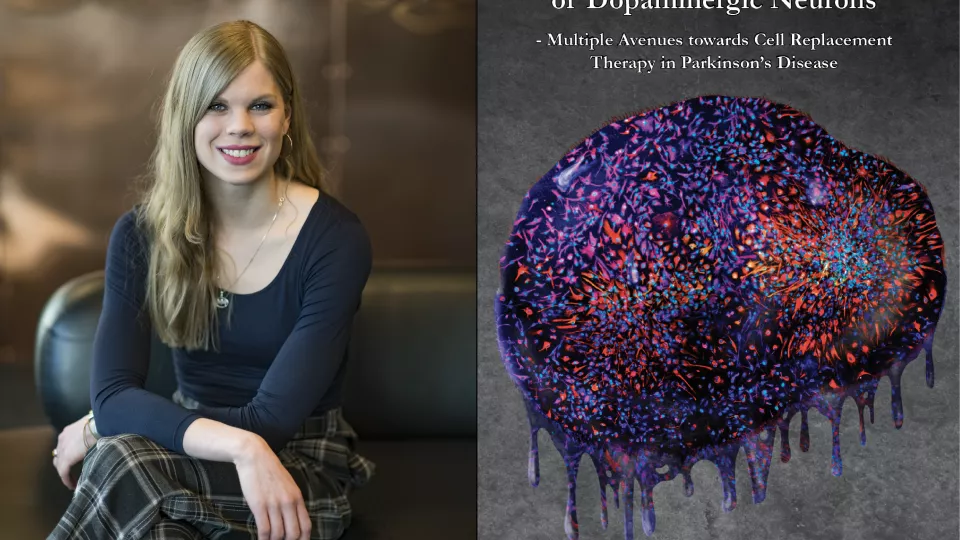Sara Nolbrant, from the Developmental and Regenerative Neurobiology lab, will be defending her PhD thesis on Friday 31st of January. Researching in the group led by Malin Parmar, Sara has been directing and dissecting the fate of dopaminergic neurons with the aim developing cell replacement therapy for the treatment of Parkinson’s disease. Here, Sara answers a few questions about her research and time spent at Lund Stem Cell Center.
What have you been working on in the Parmar lab during your PhD?
At the beginning of my PhD I was developing protocols to create midbrain dopaminergic neurons from human embryonic stem cells (hESCs) for cell replacement therapy for Parkinson’s disease, in which there is the focal degeneration of dopaminergic neurons in the midbrain. I have been using different patterning factors, small molecules and growth factors to direct stem cells to differentiate into dopaminergic progenitors, forming new neurons and replacing those lost in Parkinson’s disease. This work has been especially important for an upcoming clinical trial, for which I have been involved in refining and clinically adapting the hESC differentiation protocol. As well as this, I have been identifying dopaminergic progenitor markers in vitro to successfully predict the outcome of grafts in vivo.
More recently, I have been working with direct reprogramming of somatic cells to generate new neurons for brain repair. This is a very exciting alternative strategy for replacing lost dopaminergic neurons through direct conversion. In this process, somatic cells are directly reprogrammed to induced neurons, through virus mediated delivery of transgenes, without passing through an intermediate pluripotent stage.
Why is this research important?
When you have Parkinson’s disease you lose dopaminergic neurons and therefore have reduced dopamine transmission in the brain. Current therapies are purely symptomatic, elevating the dopamine levels by taking medicine. Also, the effect of this pharmacological therapy declines with time and patients commonly develop side effects. However, by replacing the actual cells that die you could get a targeted and regulated release of dopamine and therefore circumvent some of the side effects that are associated with the dopamine medicine. Cell replacement therapy could also have a more restorative effect, not only treating the symptoms but also reconstructing the circuitry.
How did you end up doing a PhD?
Before I started at Lund University I took 3 years off, where I did a lot of different things. I worked in Sweden, took some courses in music history and criminology and went to London for a year while I was thinking about what I wanted to do next. While I was in London I met somebody who was studying biomedicine. When she told me the sort of things she was learning about I thought - this sounds exactly like what I am interested in! I started the Biomedical program in Lund, did some summer courses in the lab and I really enjoyed it, so I continued to a PhD. I really like that you continue to learn and develop and it’s very exciting and varied work. It’s never boring.
What excites you about your work?
It’s the thrill of discovering new things, to do something that no-one has done before. It’s also nice to do something that you think is important. In our group, it’s been very easy to see the direct implications of the research. During my PhD, I have also been involved with clinical translation, developing technology transfers and also interacting with patients and observing first-hand the implications of this research.
What has been the most challenging aspect of your PhD?
To accept that you don’t always succeed. Frequently your experiments may fail and you have to repeat them. You need to figure out what went wrong, the next steps you have to take and you need to be sure that you do it the best way possible. That was hard in the beginning, but something you have to learn how to deal with early.
What are your plans for after you defend your thesis?
I will go to San Francisco to start a postdoctoral position in early spring. I will continue to work with human cells in a stem cell based system - studying brain development, cell type specification and brain evolution.
Finish the sentence - The best thing about Lund Stem Cell Center is….
The environment. I like it a lot and I think it’s really well managed. Also, Unistem day! It’s so much fun to meet and engage with all the students.
Sara will be defending her PhD thesis titled:
“Directing and dissecting the fate of dopaminergic neurons- Multiple avenues towards cell replacement therapy in Parkinson's Disease”
Friday 31st January 2020 at 09:00 at Segerfalksalen, BMC A10.
Her opponent is Prof. Maeve Caldwell from Trinity College, the University of Dublin, Ireland
Good Luck Sara!


